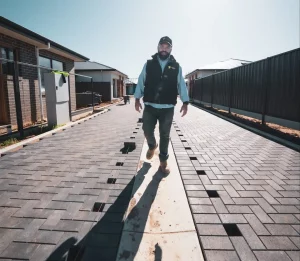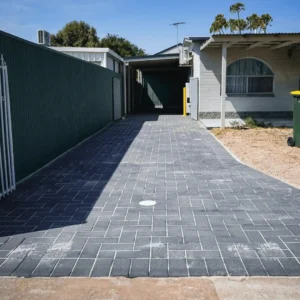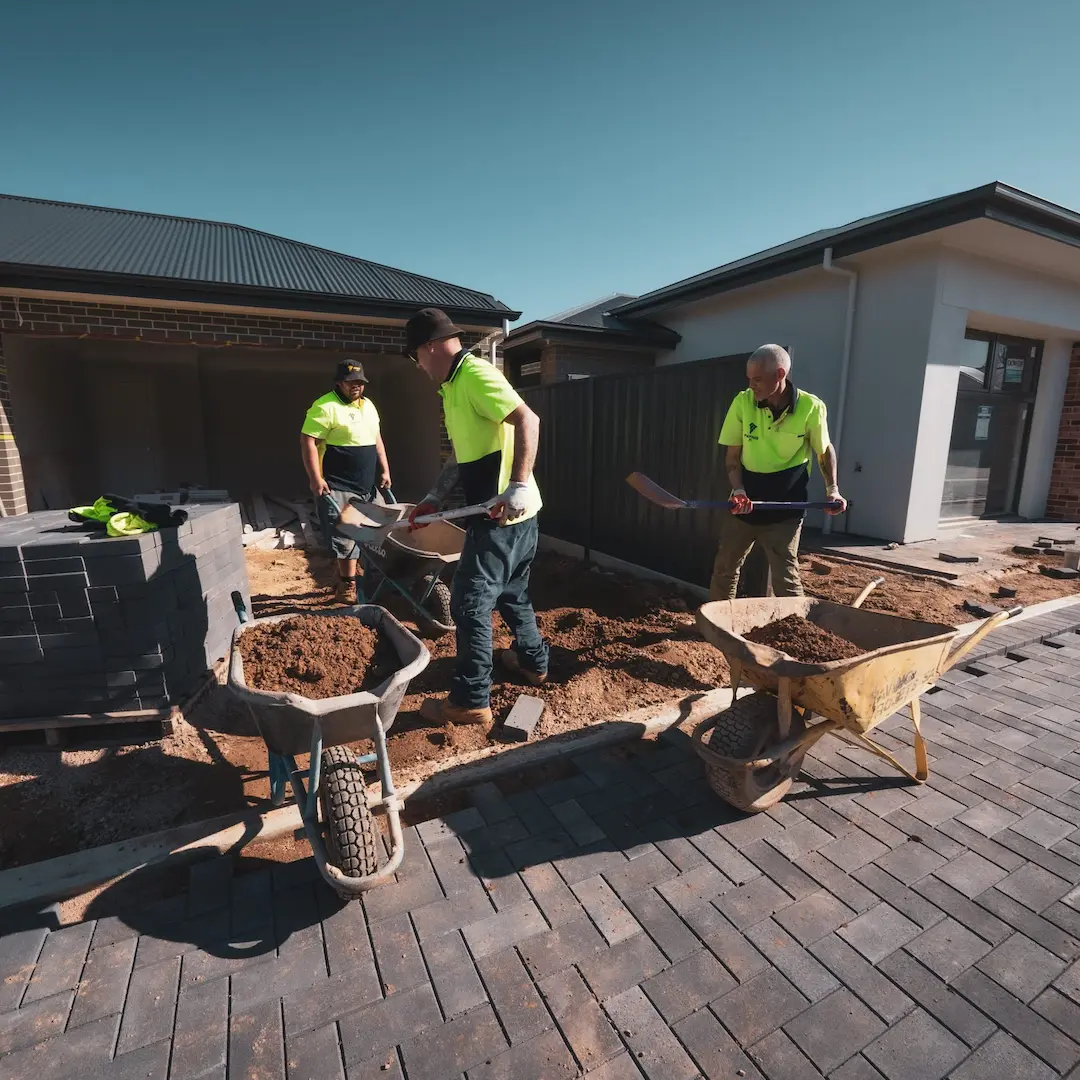Are you planning to revamp your patio or install a new driveway? One crucial aspect that can make or break your project’s success is choosing the right paver thickness. This might seem like a minor detail, but the right paver thickness ensures longevity, durability, and a visually appealing result. So, “how do I know how thick my pavers should be?” Let’s dive in and explore the factors that influence paver thickness choice and how to select the perfect pavers for your patio or driveway. At Paving SA, our expert team of paving contractors in Adelaide supply and install a wide variety of pavers to suit any thickness requirements.
Key Takeaways
- Determine the appropriate paver thickness based on purpose, weight-bearing capacity and existing surfaces.
- Consider budget, desired aesthetic and durability/maintenance needs when selecting pavers for a project.
- Ensure stability and drainage with proper preparation of surface to achieve successful installation results.
Determining the Right Thickness for Your Pavers
It is important to select the ideal thickness for pavers, as several factors must be taken into account when making this decision. Things like the purpose of the area, carrying capacity and existing surfaces play a role in choosing paver dimensions that are both attractive and durable enough to handle traffic and weight loads over time. To make sure your driveway or patio ends up with even settlements, it’s essential that all paving elements have uniformity in terms of their thickness throughout each section of work completed on any project. Knowing what will best suit your specific needs regarding size makes picking out suitable materials easier – whether it’s for patios, walkways or driveways!
Purpose of the Area
When constructing a new patio, the thickness of the pavers is crucial to its durability and suitability for purpose. Thicker options provide more weight bearing capacity than their thin alternatives – making them suitable for patios subject to higher traffic or heavier loads. Conversely, driveways need thicker paving materials that can withstand vehicular weight whereas walkways require enough thickness so as not to be adversely affected by footfall over time. One should take into account an area’s intended use when selecting paver types in order ensure they are thick enough to stand sustained usage without degradation due to course.
Weight-Bearing Requirements
When selecting the thickness of pavers, taking into account their weight-bearing requirements is critical. Also known as regular pavers, thicker ones are more suitable to support larger loads such as driveways, double the thickness increases its breaking load four times over! Brick pavers with 50mm or 60mm thickness work best in these areas due to being able to endure heavy burdens. And correct installation must be ensured so that they last long in optimal performance. For places where there will be lots of pedestrian foot traffic, heavier varieties can resist all this strain better than thinner versions do.
Existing Surfaces
When choosing pavers for a project, the existing surface needs to be taken into account. Thin paver options that can accommodate concrete decks, walkways, patios and lanais include sand set or glue set techniques as well as mortar sets. It is important to bear in mind that thinner types of paver may not have enough strength when exposed to additional loads, which could mean thicker varieties are needed instead. The proper thickness must be the proper thickness. Be assessed first before any decisions on what type of paving material should be used are made.
Types of Pavers: Thick and Thin
When it comes to pavers, there are two primary options: thick and thin. Thick ones measure 2 3/8 inches (60mm) and work best in driveways or high-traffic spots while thinner 1 1/4 inch varieties (30mm), suitable for patios or other pedestrian applications, exist as well. Understanding the benefits of commercial products compared with other paver types will help you determine what is right for your project.
Thick Pavers
Thick pavers are the perfect choice for constructing new structures, managing busy roads and doing projects where concrete cannot be used. Made of robust materials like clay or concrete, these 60mm or 80mm pieces can support significant weights such as driveways around cities and commercial streets due to their improved strength and durability. The advantages of thick pavers include unparalleled longevity even in areas with frequent use. Plus they are easy to replace if damaged in any way, requiring minimal maintenance along its lifetime span.
Thin Pavers
Thin pavers are a great option for those looking to revamp their patio, driveway or sidewalk by laying them over existing concrete. Though they may initially appear less expensive than thicker alternatives, it’s essential that thin pavers are properly installed in order to ensure the highest levels of durability. Not only can these lightweight paving materials provide an attractive surface finish – such as brick and stone – but also offer potential design variety when combined with landscaping elements like soft ground coverings. Thin-pavers remain a smart choice if you’re wanting to spruce up your patios without extensive demolition work.
Paver Thickness for Different Applications
When working on a patio, driveway or other pedestrian area, it’s essential to select the correct thickness of pavers. To create an effective and attractive end result that is enduringly stable, you must consider many factors such as how much weight will need to be supported and if there are existing surfaces in place before making your decision. Understanding these individual needs for each project will help ensure successful completion by using the most suitable paver thickness available. By keeping all these considerations in mind when choosing, you can build something beautiful while also providing long-lasting durability for the entire project.
Patios
When creating a patio, it is wise to look at the necessary paver thickness which should be between 50-60mm. This dimension provides great stability for sustaining heavy foot traffic and furniture while also having an attractive appearance that will last over time. It’s important to consider the use of your patio area as well as how much weight you plan on putting on the pavers when choosing this crucial component. By doing so, you’ll guarantee an installation that not only looks incredible, but can withstand whatever activity or elements come its way!
Driveways
When it comes to driveways, a thicker paver is essential in order for the surface to be able to support the weight and movement of cars. 60-80mm thickness should be chosen as this provides strength and resilience sufficient enough for vehicular traffic without risk of cracking or sinking. For these reasons, strong materials such as concrete or brick are also recommended when choosing driveway pavers since they can handle regular wear from car use over time. This way you’ll have an attractive long lasting finish that will take everyday impacts with ease!
Sidewalks and Pedestrian Areas
Choosing an appropriate paver thickness for sidewalks and pedestrian areas is essential to create a safe, long-lasting, attractive surface that can support the weight of foot traffic. Speaking, 40-50mm in depth should be enough – approximately half the regular recommended thickness – as it provides a secure base while also boosting aesthetic appeal. This way you can ensure your sidewalk or pedestrian area looks good and will remain so even under pressure from footfall.
Installation Considerations for Different Paver Thicknesses
For long-lasting, effective pavers, the installation process must be done properly and considerations should include picking an appropriate base material. When laying down on existing concrete surfaces, it is essential to take into account the thickness of the paver in question. By doing this research beforehand, a successful outcome can be achieved based upon individual project requirements.
Considering various types of paving materials with different levels of thickness will not only provide you with desired results but also guide you toward making a wise selection for your specific purpose at hand. To ensure success throughout any kind of task such as installing these products, let us delve deeper into key factors related to varied thickness options that are available within this particular domain today!
Paver Base Material
The selection of the foundation material for your paved area is essential to ensure its longevity and strength. The paver thickness should be taken into account when selecting the right type of base. Thicker pavers require a secure, solid layer made up of crushed rock, sand or firmly-compacted earth in order to withstand their weight as well as additional loading. Thinner variants necessitate using materials such as open graded aggregate or even manmade elements like synthetic aggregates that provide stability and can bear up with thin layers easily without buckling under traffic and load pressure. By choosing an appropriate bottom structure for any project involving paving stones, you will have ensured durability over time – it’s important not only which pavers are selected, but also what kind of underlying groundwork they sit on!
Laying Pavers Over Existing Concrete
When laying concrete pavers over an existing slab of concrete, it is essential to take into account the quality and condition of this surface. It should be checked for any bumps or cracks which could impact its stability when installing the new pavers. A layer of sand needs to be spread on top in order to create a solid base that will guarantee lasting durability once completed.
Proper drainage must also be ensured so as not to compromise water running away from the area with newly-laid stone coverings – thus avoiding potential issues down the line regarding either these surfaces or what lies beneath them.
By examining thoroughly before continuing with your task and by making sure all bases are covered (for example, adding sand), you can enjoy a gorgeous finish while having confidence knowing that it’s built upon sturdy foundations, giving years worth of satisfaction!
Factors Influencing Paver Thickness Choice
When considering which pavers to choose for your project, there are several important factors that must be taken into account in order to make the right choice. These include budgetary restrictions, desired aesthetics and of course paver thickness when it comes to durability and maintenance requirements. Carefully evaluating each factor will help you decide on the most suitable type of pavement for your particular needs. With this being said, let’s delve deeper into these considerations so as to better inform our decisions regarding selecting pavers appropriate for any given project or situation!
Budget
When deciding on a paver thickness for your project, the budget should be taken into account. Thicker pavers may cost more initially but offer greater durability and could prove to be economically beneficial in the long run due to fewer maintenance costs being incurred. On the contrary, thinner pavers can provide an inexpensive solution upfront. They don’t have as much strength or longevity associated with them as thicker options do.
Thus it is essential that one takes a comprehensive view of all expenses when selecting which option best suits their needs financially speaking while still delivering satisfactory results overall.
Aesthetics
When selecting the thickness of pavers, aesthetic is a significant consideration. Different heights can provide unique looks and styles that have an impact on the overall appearance of your project. For instance, thicker ones give off a more pronounced vibe while thin pavers convey lightness and spaciousness.
Using larger format varieties could make any cramped space seem bigger whereas thinner models offer open feeling with extra airy effect. Which design you prefer will depend heavily upon individual style preferences and desired end result for this venture.
Durability and Maintenance
When deciding on the right paver thickness for your project, it’s essential to consider durability and maintenance. Speaking, thicker pavers provide more resilience against heavy loads and will require less upkeep over time than thinner slabs that may be prone to splitting or breaking under pressure.
Aside from this primary factor, there are other aspects of soil type and usage which can contribute to making sure you select an adequate paver thickness. One that is both attractive while being able to handle long-term wear with minimal fuss. By assessing these needs beforehand we can ensure our chosen surface has optimal strength without excess care needed down the line.
Tips for Choosing the Perfect Pavers for Your Project
For a successful installation that meets your needs, it is essential to consider the particular purpose of the area and its load-bearing capacities. Existing surfaces may have an influence on selecting pavers with appropriate thickness for your project. When you’ve taken all of these things into account along with budgetary restraints as well as aesthetic preferences and maintenance requirements, then you can confidently make a final decision about which paver option works best in terms of both looks and lasting quality.
Summary
When selecting the correct paver thickness for any patio or driveway project, it is essential to consider factors such as what purpose it serves, weight requirements and existing surfaces, budget constraints plus aesthetics and durability of materials used. Taking all these aspects into account will allow you to make a smart decision that suits your individual needs while creating an attractive structure with robustness and longevity which can increase the value of your outdoor living space in years ahead. We highly recommend speaking to professional paving contractors prior to engaging in paver selection. Our friendly team of paver installers at Paving SA have been paving Adelaide driveways and patios for years and have a wealth of knowledge available at your disposal. Schedule a free quote today and get in touch!
Frequently Asked Questions
How thick should my pavers be?
When it comes to residential use, concrete pavers should be thickened to 2 3/8′′ (60mm) for improved durability. For commercial applications such as driveways, a thicker paver of approximately 3 1/8’’ (80mm) is suggested in order to make sure the pavement remains resilient and firm.
Does thickness of pavers matter?
The thickness of pavers is an important factor to consider when choosing which type for commercial driveways or heavily travelled areas due to their ability to withstand the weight of cars, trucks and other vehicles. Thicker models are more suitable for those types of applications.
How do you choose paver size?
When it comes to paver selection, the main factor is the area of your project. For bigger spaces, big-format pavers are a great option. While slim ones suit more compact locations better. Bear in mind that larger sizes can also reduce the perception of size for patios or similar areas.
How thick should stone be under pavers?
For pedestrian traffic, a 4-inch crushed stone base is suggested to be laid over granular soil and 6 inches if the underlying clay is present. For pavers which will support vehicle weight, it’s recommended to lay down an even thicker subbase of between six and eight inches.
Can I lay pavers over existing concrete surfaces?
You can cover your existing concrete with pavers as long as you take care of things like adequate sand layers and correct drainage. The process still involves laying down the pavers over the current concrete surface, but this must be done carefully to make sure all elements are necessary.




